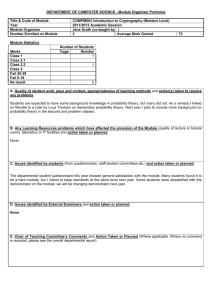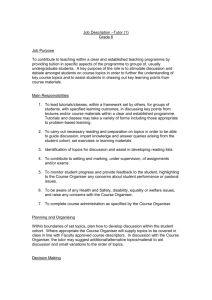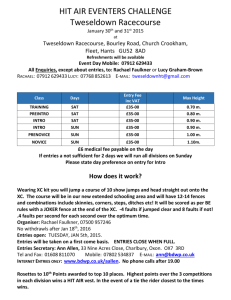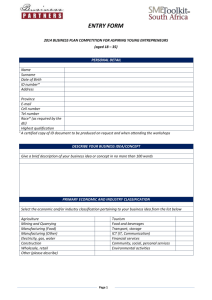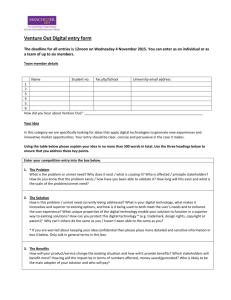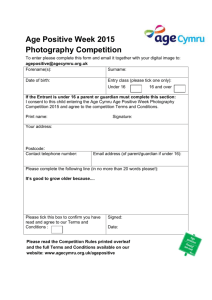Venture Further 2015 – Competition details
advertisement
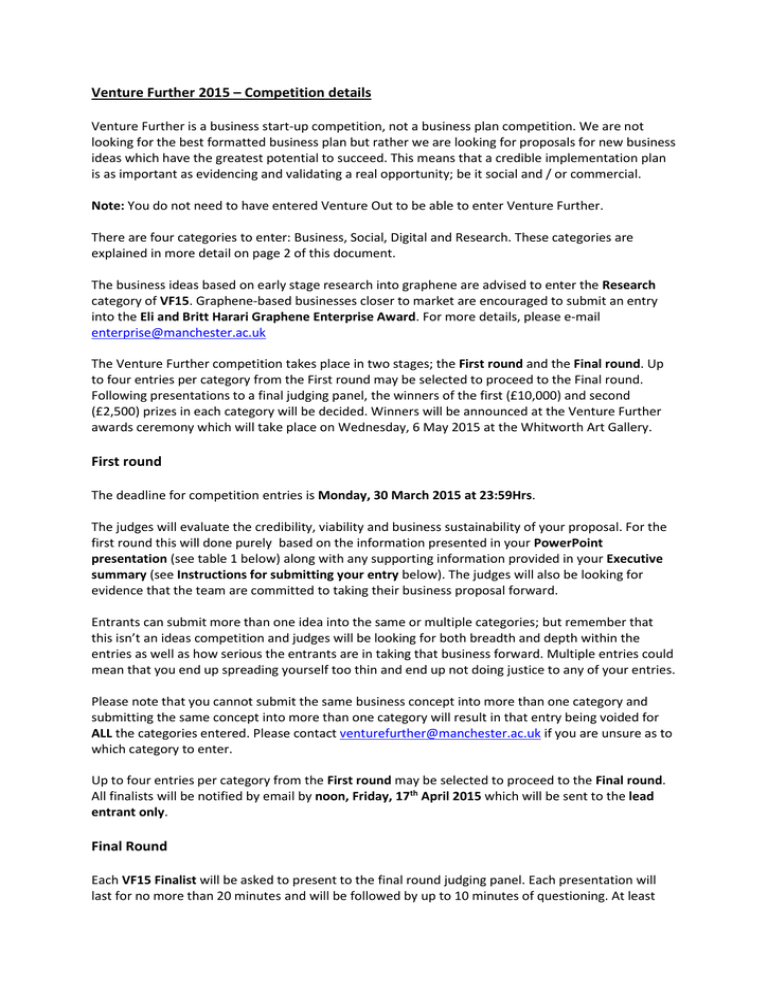
Venture Further 2015 – Competition details Venture Further is a business start-up competition, not a business plan competition. We are not looking for the best formatted business plan but rather we are looking for proposals for new business ideas which have the greatest potential to succeed. This means that a credible implementation plan is as important as evidencing and validating a real opportunity; be it social and / or commercial. Note: You do not need to have entered Venture Out to be able to enter Venture Further. There are four categories to enter: Business, Social, Digital and Research. These categories are explained in more detail on page 2 of this document. The business ideas based on early stage research into graphene are advised to enter the Research category of VF15. Graphene-based businesses closer to market are encouraged to submit an entry into the Eli and Britt Harari Graphene Enterprise Award. For more details, please e-mail enterprise@manchester.ac.uk The Venture Further competition takes place in two stages; the First round and the Final round. Up to four entries per category from the First round may be selected to proceed to the Final round. Following presentations to a final judging panel, the winners of the first (£10,000) and second (£2,500) prizes in each category will be decided. Winners will be announced at the Venture Further awards ceremony which will take place on Wednesday, 6 May 2015 at the Whitworth Art Gallery. First round The deadline for competition entries is Monday, 30 March 2015 at 23:59Hrs. The judges will evaluate the credibility, viability and business sustainability of your proposal. For the first round this will done purely based on the information presented in your PowerPoint presentation (see table 1 below) along with any supporting information provided in your Executive summary (see Instructions for submitting your entry below). The judges will also be looking for evidence that the team are committed to taking their business proposal forward. Entrants can submit more than one idea into the same or multiple categories; but remember that this isn’t an ideas competition and judges will be looking for both breadth and depth within the entries as well as how serious the entrants are in taking that business forward. Multiple entries could mean that you end up spreading yourself too thin and end up not doing justice to any of your entries. Please note that you cannot submit the same business concept into more than one category and submitting the same concept into more than one category will result in that entry being voided for ALL the categories entered. Please contact venturefurther@manchester.ac.uk if you are unsure as to which category to enter. Up to four entries per category from the First round may be selected to proceed to the Final round. All finalists will be notified by email by noon, Friday, 17th April 2015 which will be sent to the lead entrant only. Final Round Each VF15 Finalist will be asked to present to the final round judging panel. Each presentation will last for no more than 20 minutes and will be followed by up to 10 minutes of questioning. At least one member of the Core team must attend and make the presentation. Any VF15 Finalist not able to present for any reason will be disqualified from the competition. Presentations will take place between Monday April 20th and Friday May 1st. Exact dates and location to be confirmed. All finalists will also be required to take part in a video interview over the same period. This will be agreed directly between each finalist and the video production company. Instructions for submitting the Final round presentation and executive summary will be sent direct to the lead entrant of each entry reaching the final round. Categories There are four categories to enter: Business - Proposals that have commercial potential via new products or services. Examples of previous Venture Further finalists include: Netsportique - www.netsportique.fr, www.netsportique.de, www.netsportique.es Fair-T - http://www.fair-t.com Shindigger Brewing Co. - http://shindiggerbrewing.co/ Social - Proposals that improve the lives of people and communities. Social objectives as well as commercial objectives must be clearly defined. Examples of previous Venture Further finalists include: 4Lunch - http://4lunch.co.uk Give Me Tap - www.givemetap.co.uk Digital - Proposals that apply digital technologies to generate new experiences and innovative business opportunities. An example of a previous Venture Further finalists that would have entered this category is: Zenguard – www.zenguard.org Research – Proposals that focus on the application of university-based research to real-world problems and needs typically with some form of intellectual property at the heart of the business. Examples of previous Venture Further finalists that would have entered this category include: Lipopep - http://tinyurl.com/pv6k9px Biorelate - http://biorelate.com Support Registering your interest on the Eventbrite site at http://www.eventbrite.co.uk/e/venture-furthercompetition-tickets-15591744327 and indicating which categories you are thinking of entering will ensure that you are made aware of any resources and workshops that are felt to be relevant to the development of your VF15 entry and your business proposal. Social media Facebook – /EnterpriseAtManchester LinkedIn – Manchester Enterprise Centre group Twitter – @EnterpriseMCR Instructions for submitting your entry To enter the Venture Further 2015 competition, email the following three documents only to venturefurther@manchester.ac.uk by the deadline of 23:59Hrs, 30 March 2015. A. Venture Further 2015 Entry Form (Word format only, 2003 or above) B. Executive summary (Word format only, 2003 or above) C. PowerPoint presentation (PowerPoint format only, 2003 or above) All three documents should be sent as attachments within the one e-mail. We expect all key information to be included in the relevant file as indicated in the First round entry instructions below. If your attachments exceed the maximum filesize that can be sent be e-mail then contact Competition Director, Martin Henery for further details at m.henery@manchester.ac.uk First round entry instructions A) A completed Venture Further 2015 entry form (Word format only, 2003 or above) Ensure that that all the information requested is accurate and complete B) A single Word document to include only the following (Word format only, 2003 or above): Executive Summary providing a concise overview of the key points contained within the accompanying PowerPoint presentation, e.g. opportunity, market opportunity, products/service and competitive advantage, people, plan and resource requirements. This should be a maximum of two sides of A4. Narrative on presentation slides (Maximum 200 words per slide, 2,000 words per entry). Slides should be for the most part self-explanatory and this section should provide context and further explanation only where really needed. References. Where you have provided content, data, diagrams, etc in order to explain aspects of your proposal or to evidence your point of view or the conclusions you are drawing please make sure that you reference it in Harvard format where appropriate. C) A single PowerPoint document (format: 2003 or above only) comprising your pitch deck This file should contain a set of slides (30 maximum) which address the key issues as outlined in table 1 (see below). It is entirely up to you how you format and arrange your slides and present the key content but it is expected that it will be a mix of text and graphics. It is expected that the majority of the slides will be self-explanatory but additional narrative can be provided (see section B above). Final round material If your entry is selected to progress to the final round, notification will be emailed to the nominated leader along with instructions for submitting your final round presentation and executive summary. Table 1: Key Elements to your Pitch Deck Slide Content Introduction Include your organisation’s name, current situation, historical context Opportunity / Problem What’s the opportunity you’ve spotted and why does it exist? What’s the underlying problem/need/want that needs to be addressed? Markets Market segmentation/value of market Customers Who are you are customers and what are they looking for Solution What is your offering (products and/or service) and value proposition? Competition Who else is / will be addressing the same issues (both direct and indirect competition)? Sustainable Competitive Advantage Describe the technology, secret sauce or ‘theory of change’ behind your product or service and how you will protect it. Business Model Value Chain Intellectual property (IP) will be of particular interest for entries into the Research category. Please make clear the source and ownership of the relevant IP. All claims will be reviewed by colleagues from UMIP. Explain how you make money—who pays you, your channels of distribution, revenue streams, the key resources and activities needed to deliver the value proposition and who you might need to partner with Explain the industry structure and your place in the value chain. Comments Name of business, vision, mission, products / services, whether incorporated, any relevant major milestones to date So what are the drivers of the opportunity (are a factor now or at some point in the future, what are the trends and over what time frame)? In broad terms, what is the problem/need/want that needs to be addressed and how motivated are those affected to want to resolve this issue? Evidence / validation? How have you characterised / segmented the market and what is the potential value of this market (realisable in credible terms)? Evidence / validation? Who are your customers and how have you characterised them? What issues does your customer currently face and how does that need to change for them to be happy? What criteria will they use when evaluating possible solutions? What exactly do you propose to offer your customer (product &/or service)? How will this solve their problem / meet their needs? How do you actually create value for them? Avoid presenting a ‘solution’ that is searching for a problem. Start with the problem or need/want. This is not the place for an in-depth technical explanation. Provide just the gist of how you fix the pain. Who are the key organisations currently trying to address the same issues (either in a very similar manner or using a very different approach)? How do they compare when judged using the customer’s criteria described above. Where is the gap that you can address and how do you compare? Are there other key competitors that are likely to emerge over time? Aim for less text and more diagrams, schematics and flowcharts on this slide. Validation with papers, patents and objective proofs of concepts are helpful here. What are the advances in IT or technology that enable your solution? If a social enterprise, what is the theory of change, the underlying fundamentals that explain change in behaviour, the success of interventions, etc.)? How will you protect those ‘points of difference’ (IP, patents, brand)? In general, a unique, untested business model is a scary proposition. If you truly have a revolutionary business model, explain it in terms of familiar ones but make clear the advantages. Use Osterwalder’s framework if possible. How will the end customer be reached, what is the current structure and will your proposed business model change that in anyway? How will you get into the chain and what forces will be acting in your favour and what against? Economics Pricing and cost structure Roadmap / execution plan Explain how you will develop your business with value added milestones. Marketing and Sales Plan Explain how you will reach your customer and your marketing leverage points. Competitive strategy Explain how you intend to position yourself and to engage with the competition. Describe the key players on your management team, board of directors and board of advisors, as well as any other mentors. Do you have any investors? Management Team Financial Projections and Key Metrics Provide a three- to five-year forecast containing headline figures not only pounds but also key metrics, such as number of customers and conversion rate. (No need for pages of Excel but just key metrics) Resources requirements What are your major resource requirements including funding and how do you plan to acquire these Risks and assumptions Risk mitigation plan and hypothesis testing New businesses bring with them varying degrees of uncertainty which can make both evaluation of a proposal and planning difficult. We subscribe to a process of validated learning and assumption testing. That is recognising and testing critical assumptions early on can build up confidence in a business proposal as will the incorporation of this approach in your planning and implementation roadmap Explain what your pricing strategy is and how you arrived at your pricing. Explain the cost structure of your business in broad terms indicating split between fixed / variable costs and which elements of your costs are critical to financial viability and the factors affecting them. What are the overall business objectives (short and medium term)? In diagrammatic form provide a timeline as to how your business will develop, key milestones with deliverables and how reaching them will add value to your business? What major resources are required? Convince the audience that you have an effective go-to-market strategy that will not break the bank. How will you engage with and create customers (from awareness to purchase)? What’s your action plan and budget? Explain your strategy and how you will engage with existing competition and how that might change over time Try to link to development plans indicating where the expertise of the team comes into play. Do not be afraid to show up with less than a perfect team. All start-ups have holes in their team—what’s truly important is whether you understand that there are holes and how you intend to fix them. Do a bottom-up forecast, i.e. start by walking through the business thinking about how sales will be made and products produced. Who is doing that, how much does it cost, how long does it take? Make sure that the figures reflect what is actually possible with the people, time and resources you have and that you can explain when asked how you make things happen (not that it just does as if by magic!) Also mention any purchasing patterns or seasonality that can affect in a significant way revenue streams and cash flow. Think of payments to suppliers for example. What are the major resources including cash, people and equipment that are critical to the development and success of the business? Why are they critical, when do you need them and how will they be acquired? What major risks does the business face and how will you mitigate, avoid or deal with them? What are the major assumptions underpinning your business and how you plan to take it forward? How will you test those and what have you tested and learnt already? Please read the attached Terms and Conditions carefully before proceeding with your application. Please read the attached Terms and Conditions carefully before proceeding with your application. Venture Further 2015 Terms and Conditions These terms and conditions apply to the Venture Further 2015 business start-up competition run by Manchester Enterprise Centre, which is part of The University of Manchester, and not to any other competition at the University. For the purposes of this competition, the following definitions apply. Terms Used The University refers to The University of Manchester. VF15 refers to Venture Further 2015 - The University’s student business start-up competition. Entries will be accepted until 23:59Hrs on 30 March 2015. The Organiser refers to the competition organiser, Manchester Enterprise Centre, which is part of The University. Student refers to any undergraduate or postgraduate student who is registered at The University on the day the competition closes, 30 March 2015. Current student status will be verified using name and student ID supplied with entry. Graduates refer to students of The University who have graduated since 30 June 2013. Graduates will be verified using name and student ID supplied with entry. Core Team refers to those members of the submitting team who are Students and/or Graduates. Businesses are Student / Graduate businesses that have either been registered with Companies House (www.companieshouse.gov.uk) or with HMRC as a sole trader (https://www.gov.uk/set-upsole-trader). Entrant Information refers collectively to the Intellectual Property Rights and other information contained within an entrant’s submission, including but not limited to: executive summary, entry form and PowerPoint slides Intellectual Property Rights refers to all intellectual and industrial property rights, including, without limitation, patents, trade-marks, designs and copyright, whether registered or unregistered, in each case in the United Kingdom and all other countries in the world. Permitted Purpose refers to the use of Entrant Information for the purposes of participating in, administering and judging VF15 and any other purposes mentioned explicitly within this document. VF15 Finalists refers to up to 16 individuals/teams chosen by the first round judging panel to go through to the final round. Up to four individuals/teams from each category (Business, Social, Digital and Research) may be selected. Conditions VF15 is open to those that have a business idea and meet the entry and eligibility criteria set out below. Eligibility 1. VF15 is open to all Students and Graduates entering as individuals or in teams. External individuals can enter as part of a team, but are not eligible to enter individually. Teams can contain up to 6 people, but at least 50% of the team must be Students and/or Graduates. Eligibility will be checked using names and student ID number. 2. Businesses entered into VF15 must not have been trading earlier than 1 January 2013. 3. Only the Core Team may present to the judging panels should you reach the final round. 4. Teams must elect a nominated leader who will receive all correspondence and who will be awarded any prizes. The nominated leader must be a Student or Graduate. 5. It is the responsibility of the nominated leader to ensure that correct and current contact details have been supplied with the initial entry and to contact VentureFurther@manchester.ac.uk with any changes and updates as necessary. The e-mail supplied by the nominated leader should be one that is checked at least once every 24 hours during the period from VF15 launch until 30 June 2015. 6. The entry form can be found at www.manchester.ac.uk/venturefurther. Entries will only be accepted using a VF15 entry form submitted via email to venturefurther@manchester.ac.uk. 7. Entries will only be valid when a completed application form is submitted by email and includes agreement to these terms and conditions by way of the signature of the nominated leader. 8. Any entries received from entrants who have not agreed to these terms and conditions will be null and void. 9. It is the responsibility of the nominated leader to make available these terms and conditions to the rest of the team and to confirm acceptance of them by all members of the team. 10. For the avoidance of doubt, these conditions apply to all members of a team that enters VF15. 11. By entering VF15 you are agreeing to provide The Organiser with relevant and accurate information about yourself and your business idea, and to enable The Organiser to ensure that you meet the entry requirements. The Organiser reserves the right to ask for further information if required. 12. Any personal data submitted as part of an entry will be held securely and used only for the purposes of participating in, administrating and judging VF15. 13. Entrants cannot submit the same business plan for VF15 as submitted to any previous Venture Further competitions. 14. The Organiser reserves the right to disqualify entries, including but not limited to disqualification on moral, ethical or legal grounds. Disqualification of entries is at the sole discretion of The Organiser whose decision is final. 15. The Organiser may at its sole discretion without notice or reason cancel VF15. 16. All entries for VF15 must be ideas for a new business. Entries for a franchise or acquisition/management buy-out will not be accepted. 17. You can enter VF15 more than once, but must not submit the same business concept into more than one category. If you submit the same idea in more than one category, each entry will be classed as void and will not be accepted. 18. All entrants must be committed to pursuing their venture as a business. 19. The Organiser reserves the right not to accept any entry if it is incomplete. 20. The deadline for entries is Monday, 30 March 2015 at 23:59Hrs. Late entries will not be accepted. Entries should be submitted by email to venturefurther@manchester.ac.uk. All entries will be acknowledged by noon on Tuesday 31 March 2015. 21. If acknowledgement is not received within this timeframe it is your responsibility to make us aware of any such problems by sending an e-mail to venturefurther@manchester.ac.uk by 5pm on Tuesday 31 March 2015. 22. Entry submission deadlines and the dates for judging and announcing the winning teams for VF15 may be changed at the sole discretion of The Organiser. Any changes to these dates will be notified by the posting of information on the VF15 website www.manchester.ac.uk/venturefurther and by e-mail to members of the VF15 competition mailing list. Intellectual Property and Rights of Third Parties 23. It is the responsibility of the entrant to ensure that they have the right to exploit any relevant Intellectual Property Rights contained and/or comprised in the Entrant Information and that they have taken appropriate steps to protect such Intellectual Property Rights and secure any necessary consent(s) so that such Entrant Information may be used for the Permitted Purpose. 24. All Entrant Information must be based on the Core Team’s own business ideas. By submitting the Entrant Information you are attesting to your right to present the Entrant Information as your own. 25. Students or Graduates should be aware that any ideas developed in the course of research projects in conjunction with The University may have implications for the ownership of the relevant Intellectual Property Rights. Students and Graduates should familiarise themselves with the University’s intellectual property policy,available here: http://documents.manchester.ac.uk/DocuInfo.aspx?DocID=487. 26. Intellectual property (IP) will be of particular interest for entries into the Research category. Please make clear the source and ownership of the relevant IP. All claims will be reviewed by colleagues from UMIP. The University will not be responsible or liable in any way if someone claims that an entry and/or any Entrant Information infringes their Intellectual Property Rights, the entrant will be responsible. If such a situation arises, the entrant will be disqualified from the competition and The University reserves the right to take further action. 27. The Organiser may at its sole discretion without notice or reason disqualify an entry if it considers that acceptance and/or use of such entry may cause The University or any person or entity authorised by The University to be in breach of a third party’s rights in any Entrant Information. The Judging 28. Up to four VF15 Finalists will be chosen by the first-round judges for each of the four categories (Business, Social, Digital and Research). An entrant may be chosen as a VF15 Finalist for more than one category. 29. VF15 Finalists will be required to give a presentation prior to the VF15 prize giving at times to be arranged with The Organiser. The presentation will be no more than 20 minutes and will be followed by up to 10 minutes of questioning. At least one member of the Core Team MUST attend and give the presentation. Any VF15 Finalist not able to present for any reason will be disqualified. 30. Entrants agree to their name, likeness (including photograph and video) and Entrant Information being used in any publicity associated with VF15 by The Organiser and The University. 31. By entering VF15, all entrants agree to be photographed and filmed as required by the Organiser. All Intellectual Property Rights in and to such photographs and films belong to The University for use by The Organiser and The University for marketing purposes connected to the competition. 32. VF15 Finalists must be available for photos and video interviews in the month up to and including the VF15 awards ceremony. 33. All entrants (including the winners) must seek written approval from The Organiser prior to releasing any marketing or press materials related to VF15, The Organiser or The University. Entrants must not use any trademarks, designs, brand and trade names or any other material which identifies or makes use of information related to VF15, The Organiser or The University without first seeking such permission. The University reserves the right to take further action should entrants fail to comply with this condition. 34. Winners of VF15 will be announced at the prize giving ceremony which will take place on Wednesday, 6 May 2015. A representative from each VF15 Finalist team must attend the ceremony. The names of the winners will also be posted on the Venture Further website: www.manchester.ac.uk/venturefurther. 35. The prizes for VF15 will consist of 2 cash prizes per category: one first prize of £10,000 and one second prize of £2500. The Organiser reserves the right to change the amount and the allocation of the prize fund at any time. Any changes will be posted on the Venture Further website: www.manchester.ac.uk/venturefurther. 36. The decision of the judges is final. The judges may decide to award joint prizes. If there are no entries of a sufficient quality, at the absolute discretion of the judges, the right not to award any prize is reserved. 37. Prize winning teams must contact The Organiser by email to m.henery@manchester.ac.uk by 3pm on Friday, 3 July 2015 in order to claim their prize money. Prize money will be paid with a cheque made payable to the nominated leader. The University and The Organiser are not responsible for making separate payments to team members and shall have no liability to pay any money to any person other than the nominated leader. It is for the members of the team to determine how prize money will be split. The University will not be responsible or liable in any way for any dispute whatsoever arising between team members in relation to the prize. 38. No prize is transferable without the written consent of The Organiser. 39. Prizes must be cashed within one month of the cheque date, after this point all prizes shall become null and void. If the prize winning team does not claim their prize money within the given period, the prize money will not be payable and will remain with The University to be used at its discretion. 40. The Organiser and The University make no warranty or representations for themselves or on behalf of persons authorised by them as to the accuracy of any information supplied to the entrants during VF15. 41. Whilst The Organiser shall treat all materials supplied with care, entrants should retain their own copies for future use. The Organiser will not return entries that are submitted for VF15. 42. Nothing in these rules is intended to, or shall operate to, create a partnership or joint venture of any kind between The Organiser, The University, its authorised representatives or the entrants; or to authorise any party to act as an agent for the other. 43. The Organiser reserves the right not to accept entries to VF15 that do not comply with these terms and conditions in full, and to vary, delete or add to these terms and conditions at any time during or after completion of VF15 in its sole discretion. 44. For information about VF15 administration, clarification of rules and general enquires, contact the competition organisers at venturefurther@manchester.ac.uk.
